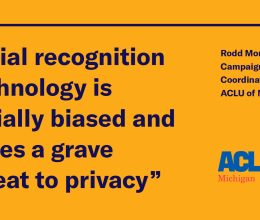
FOR IMMEDIATE RELEASE
DETROIT – The American Civil Liberties Union of Michigan (ACLU) filed two Freedom of Information Act (FOIA) requests today, with the Michigan Department of State (DOS) and Michigan State Police (MSP), further investigating the statewide scope of facial recognition activities in Michigan. The ACLU opposes the technology’s use in any form, as research shows it would disparately impact people of color, will further erode trust between law enforcement and policed communities, and because it poses a grave danger to the privacy rights of everyone.
“The public has a right to know exactly how the state is using facial recognition technology, which is proven to be racially biased and threatens everyone’s right to privacy,” said Phil Mayor, senior staff attorney for the ACLU of Michigan. “As we seek this information, we must continue to reject this divisive technology’s use statewide, especially on the heels of the Detroit Board of Police Commissioners’ unacceptable vote last week to allow its use by Detroit Police.”
Currently, the MSP maintains a comprehensive database called the Statewide Network of Agency Photos (SNAP). SNAP contains more than 50 million photos, including every Michigan driver’s license or ID photo from the DOS, mugshots, and other images the MSP culled from social media networks. In 2018, the MSP expanded SNAP by 2.7 million photos. The MSP runs facial recognition searches against this database upon request by local law enforcement agencies — and in some circumstances, including with the Detroit Police Department, the MSP allows law enforcement agencies’ direct access to SNAP to run their own facial recognition searches.
Today’s filed FOIA requests seek the following:
- Further information about the SNAP database, including its components and the legal justification for DOS automatically sharing ID photos with the MSP to include in the database;
- What facial recognition searches the MSP performs on the database, as well as the MSP’s arrangements to share access to the database with local law enforcement agencies;
- Whether and how facial recognition resources or information are shared with federal immigration authorities;
- How officers are trained; and,
- How information is secured and audited.


